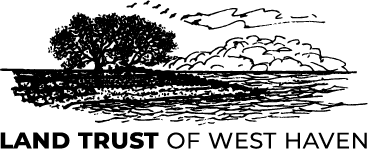The West Haven Shoreline Resilience and Coastal Restoration Project is at the 90% design stage with the final design to be completed in about a month. The project will restore 1.5 acres of public shoreline adjacent to Old Grove Park to a native coastal plant and dune habitat. It will enhance public access to passive recreation and offer environmental education through interpretive signs installed throughout the site. Once funding is secured to construct the project, the restoration is planned to begin in spring 2025.
Specific project outcomes are:
• restoration of 1.5 acres of native coastal habitat and improved habitat connectivity to adjacent public green spaces;
• a long-term plan for invasives control and restoration maintenance;
• educational signage onsite designed to engage and inform visitors about the many connections between a healthy ecosystem; climate change and coastal resilience; and economic and social well-being that will link by QR code to the Land Trust’s website for more in-depth information and links to community science projects;
• a public outreach plan that includes monthly onsite public educational talks and other activities geared to a variety of ages and audiences and school field trips; and
• improvements to public amenities, including benches, walking paths, and meeting areas; and added ADA access for residents and visitors.

The Shoreline Restoration Committee (SRC) is working with Juliana Barrett, well-respected ecologist, educator with UConn’s Connecticut Sea Grant program, and author, who works with towns and groups throughout the state on the conservation and management of coastal areas and resilience of communities, is consulting with the SRC on the interpretive signs. The SRC is also consulting with the Long Island Sound Study
The West Haven Shoreline Resilience and Coastal Restoration Project has letters of support from Save the Sound, The Connecticut Audubon Society, and Congresswoman Rosa DeLauro.
The project addresses the challenges associated with restoring and preserving native coastal wildlife habitat in a densely-populated urban area and in response to climate change; providing accessible, healthy green spaces to residents and visitors; and managing these multi-use green spaces in densely-populated areas of Long Island Sound for the benefit of both people and wildlife. Specifically, this project will address degraded coastal habitat and its impact on long-term environmental and socioeconomic community resiliency, the need for community engagement on these issues, and the need for improved access for all visitors to this invaluable recreational asset. By removing invasive species, replanting with native species in specific dune areas, and implementing long-term monitoring, this project will help address the problem of degraded coastal habitat. Further, this project will make infrastructure improvements to the boardwalk and other amenities that will make this public greenspace ADA accessible and an ideal venue for education and outreach about Long Island Sound, inviting residents and visitors to explore the connections between a healthy ecosystem and coastal resiliency in this diverse urban community.
Background Information:
In response to residents’ concern about the site’s degraded habitat, in June 2021 project leaders Marilyn Wilkes, Vice President, Land Trust of West Haven, and Mark Paine, Director, City of West Haven Parks and Recreation, formed the Shoreline Restoration Committee to develop a plan of action to remediate the site. To identify opportunities and constraints presented by the site, the Restoration Committee hired the consulting firm SLR International and solicited feedback from residents regarding what they would like to see at the site. SLR prepared four conceptual alternatives depicting nature-based coastal solutions and potential amenity space improvements. In 2022 and early 2023, the Restoration Committee vetted the conceptual alternatives with the community (via a public meeting and two online surveys) and then refined the final concept by combining the top preferences of participating residents from each of the four concepts. To further engage the public and keep them updated about ongoing progress, the Committee created a Storymap of the project. This process contributed to the completion of a nature-based Coastal Resilience Plan and preliminary engineering plans to 30% design. GEI, Inc. was then engaged to develop the 100% nature-based Coastal Resilience Plan and to strengthen the project’s ecological principles.
